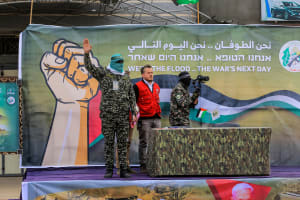As Palestinians begin olive harvest, growers report multiple attacks from Jewish settlers
NGOs claim that soldiers intended to protect Palestinian farmers do not stop settler violence

The olive harvest in the eastern Mediterranean countries usually takes place at the end of summer, just before the start of the rainy season. In the Jewish calendar, it roughly accords with the period of Sukkot (Feast of Tabernacles).
For Palestinian farmers in the territories of Judea and Samaria, the olive harvest is an important time of year, and one of their largest sources of income for the year.
This year, as in the past, there have been many reports of attacks on Palestinian farmers, mostly at the hands of extremist settlers intent on depriving the Palestinians of a source of income. For some of these extreme settlers, the hope is that by making life unbearable for the Palestinian farmers, the farmers will decide to leave, freeing the land for additional – often illegal – settlements.
Attacks on Palestinian olive farmers are not a recent development; however, they have increased since the start of the October Gaza War last year. Additionally, due to the war, the IDF, which has authority over most roads and transit throughout Judea and Samaria, has imposed various restrictions on movement between Palestinian villages and certain agricultural areas.
Unfortunately, while most of the violent encounters are started by extremist settlers, the IDF is often slow to respond. Videos shared by NGOs who monitor such incidents often show soldiers standing by as settlers assault Palestinian farmers.
Since the war broke out, the military has been almost completely preventing the Palestinian farmers from harvesting their olives. However, the settlers who steal the Palestinian-owned crops aren't being arrested or held accountable. Watch this video taken by us this morning: pic.twitter.com/72IHrdy5Qj
— Yesh Din English (@Yesh_Din) October 27, 2023
According to NGO "Yesh Din" (Hebrew for “There is Justice”), the IDF permits access to some privately owned farmlands only twice a year and often only for several days – in the spring for plowing and in the fall for harvesting.
When access to the farmlands is permitted, the IDF soldiers are expected to escort the Palestinian farmers and protect them from settler attacks. However, Yesh Din and B’Tselem, another NGO monitoring settler violence, have shared multiple videos of soldiers standing by while settlers harass Palestinians.
During the October and November 2023 olive harvest, Yesh Din reported 113 violent incidents involving settlers and soldiers disrupting the harvest. In 61 of those incidents, only settlers were involved, while in 32 events both settlers and soldiers were involved in harassing the farmers. In 20 additional instances, Yesh Din said that only soldiers were involved in denying the farmers access to their land, with some even confiscating equipment.
This year, Yesh Din has already reported 36 incidents involving attacks on farmers and Palestinian farmlands since Oct. 3 of this year, including on Yom Kippur.
This afternoon, Yesh Din's Field Researcher documented an armed settler stealing olives from a privately-owned plot of land belonging to residents of Awarta, a Palestinian village near the Itamar settlement. pic.twitter.com/MZGu99sCyx
— Yesh Din English (@Yesh_Din) October 10, 2024
According to the Palestinian Authority (PA), the official start of the olive harvest begins on Tuesday. However, Yesh Din said the IDF has yet to coordinate access to the olive groves.
Hosam Aida (70) a Palestinian-American, told CBS News he hasn’t seen his groves since last October. He claims that when he came to harvest last year, IDF soldiers told him to leave and threatened to shoot him.
He told the U.S. news organization he was not willing to abandon his lands.
“I have my American passport. I have all my kids born in the United States, but I'm not going to leave my lands," he told CBS News.
Raad Abu Amr, the council head of Jalud village, south of Nablus (biblical Shechem), told Haaretz that fields that previously did not require coordination with the IDF now do need such coordination due to the war.
“There were plots that, before the war, didn't require prior coordination, but now when we try to get to them the army and settlers immediately come down and chase away the farmers," Abu Amr told Haaretz.
The Israeli newspaper claimed the Israeli defense establishment decided only to coordinate access to the plots after the end of Sukkot, toward the end of October. They said there is a shortage of the necessary forces needed to guard the olive groves during the harvest and cited fear of an increase in violence.
An army official told The Times of Israel: "The IDF and the Civil Administration are working in order to allow the residents of the region to harvest olives on the land under their authority in security, and alongside this, are working [to take] all necessary steps with the goal of protecting the security of Israeli citizens and settlements in parallel to the carrying out of the harvest.”
“Against the background of the war, the [security] forces are conducting increased risk management and [making] security adjustments in the field, which include coordination and close protection by the security forces, especially in the harvest areas near the Israeli settlements, roads, and the centers of friction in general,” the spokesman added.

The All Israel News Staff is a team of journalists in Israel.














